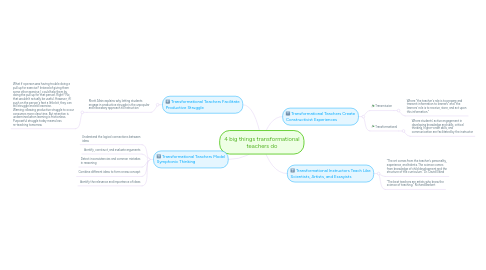
1. Transformational Teachers Model Symphonic Thinking
1.1. Understand the logical connections between ideas
1.2. Identify, construct, and evaluate arguments
1.3. Detect inconsistencies and common mistakes in reasoning
1.4. Combine different ideas to form a new concept
1.5. Identify the relevance and importance of ideas
2. Transformational Teachers Facilitate Productive Struggle
2.1. Rhett Allain explains why letting students engage in productive struggle is the unpopular and necessary approach to instruction
2.1.1. What if a person was having trouble doing a pull up for exercise? Instead of giving them some other exercise, I could help them by doing the pull up for that person. Right? No, that wouldn’t actually be useful. However, if I push on the person's feet a little bit, they can still struggle and still exercise. Warning: allowing productive struggle to occur consumes more class time. But retention is undermined when learning is frictionless. Purposeful struggle today means less re-teaching tomorrow
3. Transformational Teachers Create Constructivist Experiences
3.1. Transmission
3.1.1. Where "the teacher's role is to prepare and transmit information to learners" and "the learners' role is to receive, store, and act upon this information."
3.2. Transformational
3.2.1. Where students' active engagement in developing knowledge and skills, critical thinking, higher-order skills, and communication are facilitated by the instructor
